Dental Implants – Huntsville, OH
Lifelike Replacement Teeth Built to Last
No matter how many teeth you’re missing, you’ll want to replace them with a solution that looks great, feels natural, and stands the test of time. At Northwest Family Dental of Huntsville, we’re proud to offer dental implants, which are lifelike replacement teeth that are built to last. Since Dr. Kevin Grill can complete the entire procedure from start to finish right here in his office, he can ensure your treatment is top-quality every step of the way. To learn more and schedule your consultation for dental implants in Huntsville, call our dental office today!
Why Choose Northwest Family Dental of Huntsville for Dental Implants?
- Dental Implants Placed & Restored In-House
- Low-Interest Dental Financing Available
- Modern, Comfortable Dental Office
What Are Dental Implants?

Instead of sitting on top of your gums or remaining teeth like dental bridges and dentures do, dental implants are embedded directly into your jawbone. They are basically artificial tooth roots. Since they’re made from biocompatible titanium, they naturally begin to integrate with the jaw after being placed. This gives them the same sturdiness as your original teeth. When this process – called osseointegration – is finished, Dr. Grill can attach a dental crown, bridge, or denture to the implants to bring back the appearance of your smile. Essentially, dental implants are built just like natural teeth, making them the closest thing possible to reversing your tooth loss!
The 4-Step Dental Implant Process

Since Invisalign is one of the most popular orthodontic treatments, there’s a good chance you know quite a bit on the topic already. Even then, you might be missing some important information on what life with clear aligners actually looks like. If you want an inside look, keep reading!
It’s important to understand that there’s a multi-step procedure required to get dental implants that takes some time. Unlike dentures and dental bridges, the different stages can take several months to complete. That said, most people feel the wait is worthwhile because of the many unique advantages that come with this type of restoration. Fortunately, Dr. Grill is an expert at rebuilding smiles and is qualified to perform the surgery onsite to eliminate the need to find additional providers to streamline the process.
Although every patient’s experience is unique based on their dental condition, there are typically 4 steps required to be fitted with dental implants. Continue reading below to learn more about each, and feel free to contact us to schedule your consultation or request additional information.
Initial Dental Implant Consultation

If you’ve suffered from tooth loss and are interested in dental implants, the first thing you must do is schedule a consultation with Dr. Grill. During this appointment, he’ll take the time to learn about your dental goals and concerns to verify whether it’s the best treatment for you. Our team will also use this opportunity to examine your mouth to identify any potential problems that could interfere with your results. For example, if you have cav.ities or gum disease, we’ll have to treat those first.
We’ll also take images to measure your jawbone density to ensure it’s strong enough to maintain artificial teeth. If it’s not, a bone graft may be able to bulk it up so you can move forward with your elected procedure.
Dental Implant Surgery
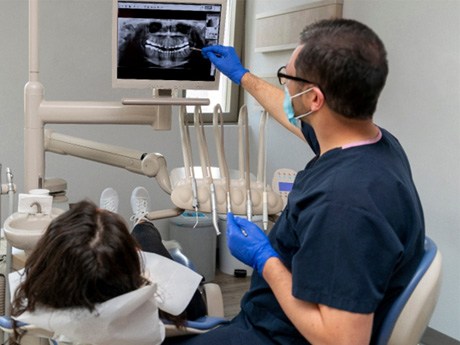
Dr. Grill is highly skilled and has completed continuing educational courses and specialized training so he’s qualified to perform the surgery in-office. Typically, you can expect the following on the day of your procedure:
- We’ll apply a local anesthetic to numb the area, so you don’t experience discomfort. We also offer nitrous oxide for patients who are overly anxious or have a hard time sitting still for long periods.
- Grill will create an incision where the implant must be placed, then insert the titanium post into your jawbone.
- Next, he’ll suture your gums closed and place a protective cap over the metal pole so it can heal.
Dental Implant Osseointegration & Abutment Placement
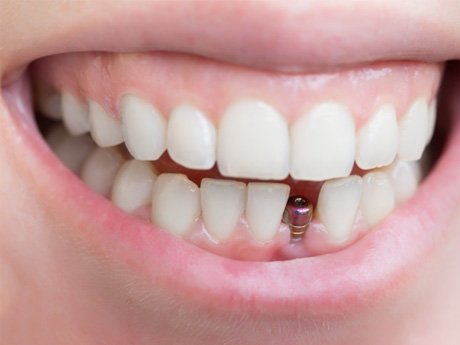
Once the implants are placed, your jawbone will fuse with them in a process called osseointegration. This can take several weeks to a few months because it takes time for your body to produce enough new bone growth to successfully merge around the metal rod. Without this step, your restoration wouldn’t be strong enough to stand on its own. This stage is what gives dental implants the added stability they’re known for.
You’ll undergo a second, smaller surgery once you’ve healed to place abutments on top of the post. You’ll need to allow your gums to heal over a few weeks so we can then take accurate impressions of your mouth. These will be used to build your final restoration.
Delivery of Dental Implant Restoration(s)
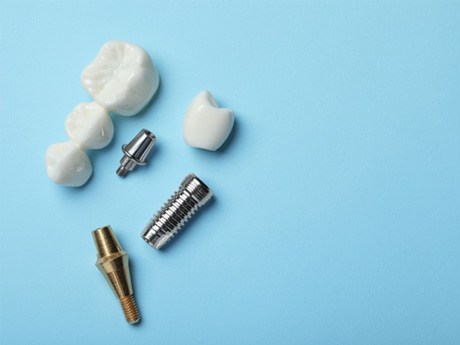
Once the dental lab returns your restoration (dental crown, bridge, or denture depending on your situation) to our location, we’ll schedule you for a final appointment to place it. Before we send you on your way, Dr. Grill will ensure that it fits as intended and that you can close your mouth comfortably with it in position. If everything checks out, you’ll finally be able to enjoy all the benefits that come with your recently rebuilt smile!
Benefits of Dental Implants

Dental implants require a surgical procedure and other steps. Because of this, they are able to provide patients with a wide array of benefits that cannot be achieved with other tooth replacement options. Continue reading to learn about some of the many advantages of replacing your missing teeth with dental implants.
Day-to-Day Benefits

Once your gums and jawbone have healed completely, your dental implants shouldn’t feel any different from your natural teeth. You might even forget which tooth is the replacement! Here are some of the benefits that you can experience every day:
- Easy to Maintain: Caring for dental implants is just like caring for natural teeth. Just brush, floss, and rinse with mouthwash every day.
- Stronger Bite: Dental implants can restore your bite force up to 90%! This is much more than what you can expect from dental bridges and dentures.
- Confidence Boost: If you are currently missing teeth, it can be easy to lack confidence. Dental implants can completely change how you feel about your appearance.
Health Benefits

Dental implants positively affect your entire body. Here are some of the ways that they can influence your health:
- Dental Health: Missing teeth increases your risk of numerous dental problems. This includes gum disease, misalignment, and additional tooth loss. Dental implants are able to prevent these issues from occurring.
- General Health: Dental health and general health are very closely related. When your smile is thriving, you are at lower risk of many serious health conditions, like diabetes and cardiovascular disease.
- Prevents Bone Loss: When the jawbone isn’t being stimulated with regular biting and chewing, the body begins to reabsorb it. Dental implants replace the roots of the missing teeth, therefore stimulating the jawbone and preventing it from deteriorating.
Long-Term Benefits

Dental implants have a higher upfront cost compared to traditional dentures and dental bridges. However, there are many good reasons for this. Here are some of the benefits that you can experience for many years to come:
- Long-Lasting: Dental implants are extremely durable. When cared for properly, you can anticipate them to last for multiple decades or the rest of your life.
- Success: Dental implants have over a 95% 10-year success rate. Dental implant failure is very rare.
- Cost-Effective: Dental implants have a higher cost upfront, but they are made to last for a very long time. You won’t need to spend more money on relines or replacements. You also don’t have to stock up on special products, like denture adhesive, to maintain them. Most of all, dental implants help to prevent dental issues that are costly to treat.
Who Dental Implants Can Help

Dental implants are undoubtedly the most versatile way to replace missing teeth. Whether you’ve lost one tooth or an entire mouthful, they can bring back your smile in a way that flawlessly mimics the original. Practically any healthy adult with a strong jawbone is suitable for this treatment, but the details may vary depending on the number of teeth you need to replace.
Who Is a Good Candidate for Dental Implants?

In the majority of cases, any adult with the following prerequisites can be eligible for dental implant treatment:
- Good Overall Health: Since you’ll need to undergo minor oral surgery, your overall health should be in good shape before beginning your procedure. This means you’ll need to keep any conditions like diabetes in check to improve the chances of a successful implant treatment.
- Great Oral Health: To minimize any risk of failure, our team will need to confirm that your mouth is free of any complications such as gum disease, decay, or infection.
- Sufficient Jawbone Density: For your dental implants to remain supported while providing optimal stability for your future restoration, your jawbone will need to have adequate volume. If your facial structure doesn’t have enough thickness, your metal posts could end up at risk of failure.
If you’re currently not a good candidate, it doesn’t mean you won’t ever be able to undergo the dental implant procedure. Our team can work with you to restore your oral and jawbone health, such as providing services like gum disease treatment and bone grafting, that way we can move forward with your tooth replacement solution.
Missing One Tooth
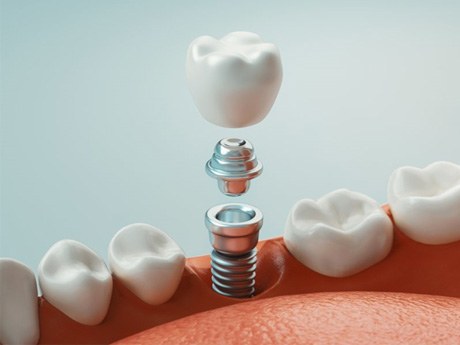
To recreate a single missing tooth, a dental implant can be placed into the jaw where the tooth’s roots used to be. After it has merged with the jawbone, Dr. Grill can attach a crown on top for a solution that completes your smile without modifying any of your remaining teeth.
In contrast, eating a mouth-healthy diet would help your dental implants thrive. That especially applies when the meals are packed with calcium, phosphorus, and vitamin C. Should you get a lot of these nutrients, you’ll strengthen your jaw and greatly reduce your risk of gum disease.
Missing Multiple Teeth
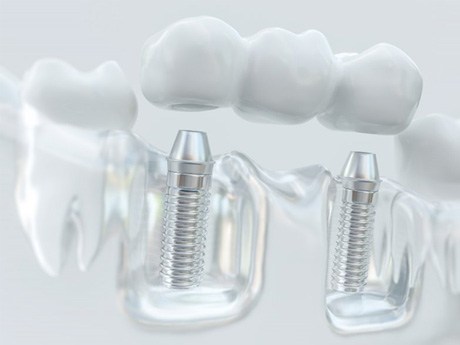
A traditional dental bridge requires removing enamel from the surrounding teeth for support, but we can also anchor a bridge onto dental implants to replace three or more consecutive teeth while preserving the rest of your smile. A small number of implants can also hold a partial denture in place for several missing teeth that aren’t in a row.
Missing All Teeth
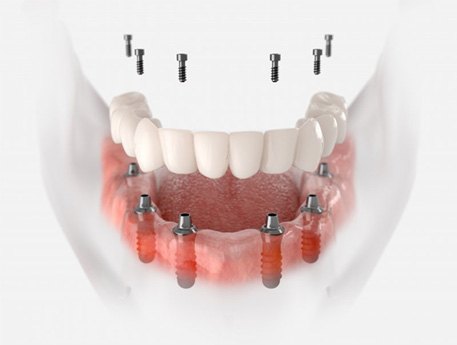
Even a full denture can be supported by dental implants. In most cases, it only takes between four and eight implant posts positioned strategically along the jaw to keep an entire row of prosthetic teeth in place in such a way that you’ll never need to worry about slipping or gum irritation. Plus, implant dentures can be either removable or fixed, depending on your preferences and needs.
Learn More About Implant Dentures Learn More About All-On-4 Implants
Understanding the Cost of Dental Implants

Dental implants offer lifelike, long-lasting results, and these effective smile restorations require patients to make a larger investment of time and money upfront than other solutions. Since no two treatment plans are exactly alike, our team at Northwest Family Dental will walk you through every step and the price associated with each before we begin restoring your smile. With this in mind, keep reading to learn some of the factors that influence the cost of dental implants in Huntsville, and contact our team with any further questions.
Preliminary Treatments & Dental Implant Surgery

If you have existing oral health problems, you'll likely need preliminary treatments before moving forward with the dental implant process. Even though services like gum disease treatment, tooth extractions, and bone grafting will add to the overall cost of your treatment, depending on your case they can be necessary to maximize the lifespan of your new smile. Fortunately, most of them are partially covered by dental insurance.
Keep in mind that dental implant surgery has a cost of its own. The good news is that we offer in-house implant placement, meaning you won’t have to worry about receiving a bill from an outside specialist. You can look forward to compact and simple fees instead of multiple payments to various practices!
The Parts of Your Dental Implant

When it comes to dental implants in Huntsville, the cost is affected by multiple factors including:
- Material – Implants made of zirconia instead of titanium typically cost less.
- Brand – Manufacturers make dental implants differently based on the needs of each patient. Be sure to ask your implant dentist where you’re getting yours from as well as any brand-specific benefits.
- Number of Dental Implants – Obviously, replacing a single missing tooth with one dental implant will cost less than replacing an entire row with an implant denture.
- Type of Restoration – Crowns, bridges, and dentures each cost different amounts. Expense corresponds to the size of the restoration.
How Dental Implants Can Save You Money

Patients on a budget often choose dentures or dental bridges as their method of tooth replacement because they’re cost-effective. Even though dental implants have a higher upfront cost, they end up paying for themselves over time. For example, you won’t need to spend on replacements or adjustments every few years.
You also don’t have to worry about purchasing special pastes, solutions, or other products to maintain your rebuilt grin. All you must do is care for your implants like you would for your natural teeth! Since they’re easier to maintain, you can more easily avoid oral health issues that would require costly dental treatment.
Does My Dental Insurance Cover Dental Implants?

Most dental insurance plans do not offer coverage for dental implants. However, there are some exceptions. Certain parts of the final restoration or your preliminary treatments might be eligible for coverage. Before committing to anything, contact your insurance provider to confirm the details of your coverage. Our team is happy to help with that step if needed!
Making Dental Implants Affordable

Don’t have dental insurance? No problem! We work with third-party financiers to help make your dental bills much easier to manage. With CareCredit, you can sign up for low-to-no-interest payment plans to break up the overall cost of your treatment into smaller monthly installments.
Also, we offer an in-house membership plan that provides a 20 percent discount on all treatments completed at our office during the membership year. Contact our team to schedule your visit with an implant dentist in Huntsville today.
Dental Implants Post-Op Instructions

Our team here at Northwest Family Dental of Huntsville can complete the entire dental implant process here in our office, saving you a lot of time, money, and effort in the long run and letting you enjoy your new smile sooner. But remember, once your implants have been placed, it falls on you to ensure they’re given the chance to succeed, and this starts with the recovery period. However, we’re here to help! To help familiarize yourself with the post-op journey, here’s what you need to know.
What to Do Directly After Dental Implant Surgery

Immediately after dental implant surgery, the most important thing to keep in mind is that the blood clot(s) that form over the surgical site(s) are there for a reason: to facilitate healing. That said, you need to ensure they’re taken care of and protected. Don’t drink from straws, smoke or use tobacco, or disturb or touch your gums. If you have excess saliva in your mouth, don’t spit it out; use tissues or simply swallow it. If a blood clot comes loose, you’ll end up with a painful condition called dry socket, and your healing process will be delayed.
Common Side Effects When Recovering from Dental Implant Placement

It isn’t always easy to differentiate between normal symptoms and concerning ones following dental implant placement, especially if you’ve never undergone oral surgery before. Remember, it’s normal to feel some mild discomfort or soreness for the first few days, but be sure to give us a call if it persists or worsens, or if you experience abnormal symptoms. Here are a few of the most common side effects that you might experience after your procedure:
- Minor discomfort, which can usually be relieved with over-the-counter or prescribed medications.
- Swelling in the gums, which can be aided with cold compresses/ice packs.
- Intermittent bleeding, which is easy to manage by applying gentle pressure with gauze or a clean cloth.
Your Diet After Dental Implant Surgery

After your procedure, you’ll need to stick to soft foods and liquids only for a few days, to ensure that your blood clots aren’t disturbed. Remember, even though you’ll be drinking a lot, do not use a straw but instead take small, careful sips, and ensure nothing you’re served is too hot or cold. Some good meal options include:
- Mashed potatoes
- Scrambled eggs
- Boiled pasta and rice
- Yogurt, pudding, and Jell-O
- Ice cream, protein shakes, and smoothies
- Cold or room temperature soups and broths
Post-Op Health & Oral Hygiene

When you have dental implants, it’s absolutely imperative that you maintain excellent oral hygiene, both immediately following the procedure and in the long run. Otherwise, your chances of gum disease drastically increase – and this condition is certain to wreak havoc across your smile and cause huge problems for your dental implants. Here are some tips to keep in mind:
- Brush your teeth like normal but be extra careful surrounding the implant sites.
- Rinse with salt water 2 – 3 times a day, especially after your meals. Do not spit out the water, but instead, let it pour from your mouth into the sink.
- Don’t use any mouthwashes that contain alcohol.
What to Do After Your New Teeth Are Attached

After you’ve recovered and your dental implants have successfully fused with your jawbone, we’ll be able to place your final restoration, which includes replacement teeth designed to look, feel, and function just like your original ones. It’s normal to feel some mild sensitivity in your gums after this, but it can normally be managed with pain relievers. If you notice any bleeding or swelling after we’ve attached your restoration, be sure to let us know right away so we can address it. Otherwise, you’re ready to reap the benefits of a newly restored and beautiful smile!
Maintaining & Caring for Your Dental Implants

Dental implants provide one of the most comprehensive, lifelike, and long-lasting solutions for replacing any number of lost teeth. However, to make the most of them, you’ll have to take proper measures to help them last as long as possible. By practicing effective preventive measures every day, you might expect your results to go as far as several decades to the rest of your life. Here are some of the most effective ways to maintain and care for your dental implants so you can enjoy your brand-new smile for years to come.
Make Oral Hygiene a Priority

Just like with natural teeth, you’ll need to keep your new pearly whites fresh by cleaning them daily. This should include brushing, flossing, and rinsing with mouthwash, especially after meals. Though your dental implants themselves won’t be vulnerable to cavities, the surrounding gum and jawbone tissues can still be susceptible to disease and decay. By cleaning your smile every day, you can significantly lower your risk of developing issues that could potentially cause your metal posts to fail, such as peri-implantitis.
Eat a Healthy Diet

Dental implants can restore the majority of your natural biting power. This means you’ll be able to enjoy most of your favorite foods without worrying about your new teeth from moving out of place. Additionally, you might consider expanding your diet to include vitamin-rich and nutrient-dense foods that can improve your oral, gum, jawbone, and overall health. These can involve meals like lean meats, fruits, vegetables, and dairy products.
Break Bad Habits

Certain habits can be quite harmful to both you and your dental implants, such as smoking or chewing tobacco. Not only can it increase the risk of developing oral cancer, but it can also interfere with your healing process as well as introduce bacteria and infection. Other habits like chewing on ice and using your teeth as tools can also potentially damage or compromise your dental implants later on. By kicking these habits to the curb, your new teeth will have a better chance of living a longer and healthier life.
Protect Your Dental Implants
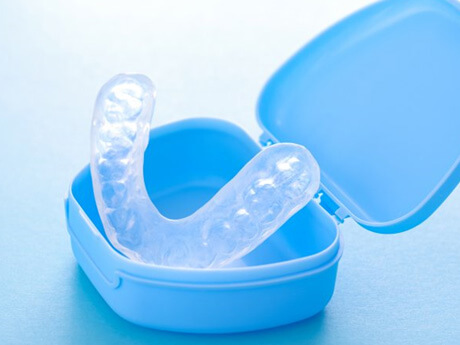
Do you commonly play contact sports? To protect your dental implants, you might consider investing in customized mouthguards that can provide cushion and safety for your smile. If you also tend to clench or grind your teeth during sleep, then nightguards for Bruxism may be just the thing you’ll need to avoid wear and tear on your restorations.
Schedule Regular Dental Checkups

Other than brushing and flossing your teeth, going to your dentist every six months for regular checkups and cleanings will also be essential for the longevity of your dental implants and smile. Not only will your dentist monitor your oral health, but they can also address any underlying issues that could lead to complications with your metal posts, such as the early stages of gingivitis.
Dental Implant Failure & Salvage

Since dental implants replace the roots of the missing teeth, they allow for all sorts of different benefits, like longevity, stability, and comfort. This is always why they have an incredible success rate of over 95%! That being said, there is still a very slim chance of failure, so it’s important to be on the lookout for signs that could indicate that something is wrong. If you have any concerns about your replacement tooth, don’t hesitate to contact us. We’d be happy to take a look and may even be able to save failing implants with dental implant salvage treatment.
Learn More About Dental Implant Failure & Salvage
Dental Implant FAQs

If you’re interested in learning more about dental implants before scheduling a consultation with our implant dentist in Huntsville, then this next section is for you! Below, you will find the answers to FAQs about this popular tooth-replacement solution – from how successful they are to what causes them to fail. Of course, if your question isn’t listed below, you’re more than welcome to give us a call as well.
How Successful Are Dental Implants?
There are numerous reasons roughly 500,000 patients choose to restore their smiles with dental implants each year, and their impressive success rate is one of them! When placed by a skilled and experienced professional, they have more than a 95% success rate. Naturally, how you care for your dental implants, teeth, and gums matter as well, which is why we strongly recommend adopting healthy habits like brushing twice a day, flossing consistently, and visiting us every six months for a checkup and cleaning.
What Can Cause Dental Implants to Fail?
On the rare occasion that dental implants do fail, it’s typically due to two things: peri-implantitis and failed osseointegration. The good news is that our Huntsville team takes proactive measures to help prevent both from arising. For example, since peri-implantitis is a form of gum disease that develops from poor oral hygiene, being consistent with your oral hygiene regimen can dramatically reduce your risk of it developing. As for failed osseointegration, that’s when the jawbone and the implant don’t fuse properly. So, we will assess the density of your jawbone prior to the procedure and, if needed, recommend a bone graft.
How Can I Tell If My Dental Implant Is Failing?
If you notice anything abnormal, including inflamed gums or pain around the implant, then you should call us ASAP. The sooner you do, the sooner we can conduct an examination and determine the root of the problem.
How Long Do Dental Implants Last?
Dental implants can actually last for more than three decades! Of course, you need to take great care of your smile in order to prolong the lifespan of yours. In addition to implementing a solid at-home oral hygiene regimen, we recommend wearing a nightguard if you grind your teeth, visiting us twice a year for a checkup and cleaning, not smoking, and eating a well-balanced diet filled with nutrient-dense foods.
Will I Have to Take Off Work for Dental Implant Surgery?
Typically, patients need a day or two to recover from dental implant surgery. With that said, we may recommend taking more time off if your job is physically intensive. After all, the last thing you want is for complications to arise, compromising the treatment process. If you’re worried about taking time off work, consider scheduling your appointment on a Friday so you have the weekend to focus solely on healing.

